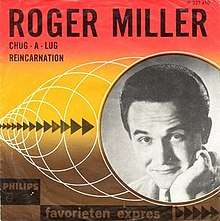Chug-a-Lug (Roger Miller song)
"Chug-a-Lug" is a song written and recorded by American country music artist Roger Miller. The song reached number 9 on the US Billboard Hot 100 in 1964, becoming his second pop hit.
| "Chug-a-Lug" | ||||
|---|---|---|---|---|
 | ||||
| Single by Roger Miller | ||||
| from the album Roger and Out | ||||
| B-side | "Reincarnation"[1] | |||
| Released | August 1964 | |||
| Genre | Country | |||
| Length | 2:04 | |||
| Label | Mercury | |||
| Songwriter(s) | Roger Miller | |||
| Producer(s) | Jerry Kennedy[2] | |||
| Roger Miller singles chronology | ||||
| ||||
Content
The song is a humorous reminiscence of youthful encounters with homemade alcoholic beverages. The expression "chug-a-lug" refers to quickly downing a drink, and the lyrics describe the singer's reaction to the extra-strong liquor. Example: "I swallered it with a smile / (sound of swallowing) / I run ten mile! Chug-a-lug, chug-a-lug / Makes you want to holler, 'Hi-dee-ho!' / Burns your tummy, don't ya know / Chug-a-lug, chug-a-lug."[3]
History
Miller said that the song was based on a true story of a friend of his who "could drink a beer in 3 seconds".[3]
Chart performance
| Chart (1964) | Peak position |
|---|---|
| Canadian RPM Country Tracks | 3 |
| New Zealand (Lever) [4] | 8 |
| U.S. Billboard Hot Country Singles | 3 |
| U.S. Billboard Hot 100 | 9 |
Cover versions
- The British group The Swinging Blue Jeans included the song on their 1966 Canada Capitol album Don't Make Me Over.
- The song was recorded on the Kentucky Headhunters' 2005 album Big Boss Man.
- This song was re-worded and used for the theme of the Hey Hey It's Saturday segment Plucka Duck.
- Country singer Toby Keith included a live version on the deluxe edition of his 2010 album Bullets in the Gun.
- A reworded version was used in animated advertisements for "Milk Chug" single-serving milk bottles.
References
- Whitburn, Joel (2008). Hot Country Songs 1944 to 2008. Record Research, Inc. p. 278. ISBN 0-89820-177-2.
- "Roger Miller - Chug-A-Lug (Vinyl)". Discogs.com. Retrieved 2016-09-27.
- Roger Miller interviewed on the Pop Chronicles (1969)
- Flavour of New Zealand, 29 October 1964
External links
This article is issued from Wikipedia. The text is licensed under Creative Commons - Attribution - Sharealike. Additional terms may apply for the media files.